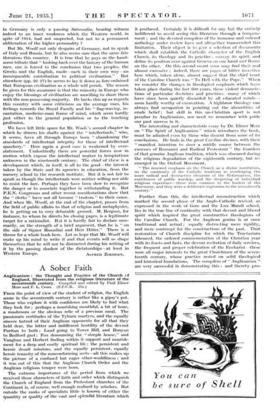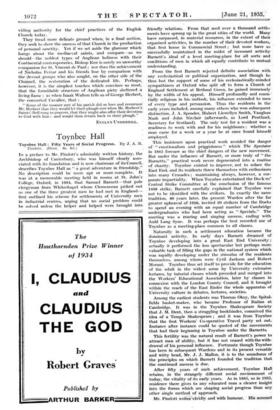A Sober Faith
Anglicanism : the Thought and Practice of the Church c f England, Illustrated from the religious literature of the seventeenth century. Compiled and edited by Paul Elmer More and F. L. Cross. (S.P.C.K. 21s.)
FROM the point of view of the student of religion, the English scene in the seventeenth century is rather like a gipsy's pot. Those who explore it with confidence arc likely to find what they look for ; perhaps a nourishing mouthful, a bit of bone, a mushroom or the obvious relic of a previous meal. The passionate certitudes of the Tyburn martyrs, and the equally
sincere hatred of their Anglican opponents for all that they held dear, the bitter and indifferent hostility of the devout Puritan to both ; Laud going to Tower Hill, and Bunyan to Bedford gaol ; Fox denouncing the "steeple house," and Vaughan and Herbert finding within it support and nourish- ment for a deep and costly spiritual life ; the persistent and 'heroic Jesuit missions, and the equally persistent, equally 'heroic tenacity of the nonconforming sects—all this makes up the picture of a confused but eager other-worldliness : and it was out of this that the Anglican Church Order and the Anglican religious temper were born.
The extreme importance of the period from which we received those characters of faith and order which distinguish the Church of England from the Protestant churches of the Continent is, of course, well enough realized by scholars. But outside the ranks of specialists little is known of either the quantity or quality of the vast and splendid literatnre which it produced. Certainly it is difficult for any but the entirely
indifferent to avoid seeing this literature through a tempera- ment ; and the devoted compilers of the immense and ordered
anthology under review have not altogether transcended this limitation. Their object is to gave a selection of documents which shall establish the Catholic character of the English Church, its theology and its practice ; convey its spirit, and define its position over against Geneva on one hand and Rome on the other. On this second count some may find their zeal almost excessive ; indeed, there are pages of bitter invective here which, taken alone, almost suggest that the chief tenet of the Caroline Church was " To Hell with the Pope." When we consider the changes in theological emphasis which have taken place during the last 300 years, these violent denuncia- tions of particular doctrines and practices—many of which have since been quietly discarded by all educated minds— seem hardly worthy of excavation. A highbrow theology can always find occupation in pointing out the absurdities of crude belief ; but skill in this un-Christian sport is not peculiar to Anglicanism, nor need we remember with pride our past success in it.
The interesting and characteristic essay by Dr. Elmer More on " The Spirit of Anglicanism " which introduces the book, must be admired even by those who dissent from some of its conclusions. He finds in the great Caroline divines, with their " manifest intention to steer a middle course between the excesses of Romanist and Radical Protestant " the founders of that genuine Anglican tradition, which was obscured during the religious degradation of the eighteenth century, but re- emerged in the Oxford Movement.
"The renewed emphasis on the Church as a divine institution, on the continuity of the Catholic tradition as overleaping the more radical and destructive elements of the Reformation, the enrichment of public worship, and the deepening of individual religious experience—these were common to the leaders of the Movement, and they were a deliberate regression to the seventeenth century."
Further than this, the intellectual reconstruction which marked the second phase of the Anglo-Catholic revival, as expressed in the work of Gore and the Lux Mundi school, lies in the true line of continuity with that devout and liberal spirit which inspired the great constructive theologians of the Caroline Church. For the Anglican genius is at once traditional and actual ; equally distrusting mere rigidity, and mere contempt for the constructions of the past. That restoration of Church discipline for which the Tractarians laboured, the ordered commemoration of the Christian year with its feasts and fasts, the devout recitation of daily services, the frequent and proper celebration of the Eucharist—these were all major interests to the great Churchmen of the seven- teenth century, whose practice rested on solid theological and historical foundations. The compilers of " Anglicanism " are very successful in demonstrating this : and thereby pro- viding authority for the chief practices of the English Church today.
They tread more delicate ground when, in a fmal section, they seek to show the success of that Church in the production of personal sanctity. Yet if we set aside the glamour which hangs about the mediaeval saints, and compare—as we should—the noblest types of Anglican holiness with their Continental contemporaries, Bishop Ken is surely no unworthy companion for St. Vincent de Paul ; nor does the achievement of Nicholas Ferrar and his friends lose by comparison with the devout groups who also sought, on the other side of the Channel, the restoration of the dedicated life. Perhaps, however, it is the simplest touches which convince us most, that the formidable structure of Anglican piety sheltered a living flame ; as when Izaak Walton tells us of George Herbert, the converted Cavalier, that :
" Some of the meaner sort of his parish did so love and reverence' Mi. Herbert that they would let their plough rest when Mr. Herbert's Saints'-Bell rung to prayers, that they might also offer their devotion' to Cod with him : and would then return back to their plough."
EVELYN UNDERUILL. •









































 Previous page
Previous page